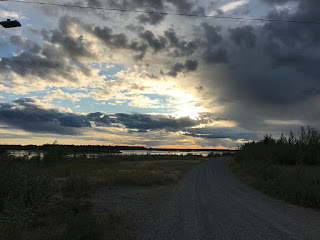Several times during this last year I've looked around and wondered,
How did this become my life? March 2, which marked the one-year anniversary of my arrival in Alaska, provided another such occasion. On that particular week I was chaperoning a school trip--my first as a teacher--whose aim was to introduce high-schoolers to state government. As such, on the second day of March I found myself in Queen-of-the-Gods, Arctic State's absurd capital city nestled on a mountain cliff that hugs tight to Canada but has no road access to the rest of its own state.
The quaint size of the state, from a population perspective, means leaders and people share a closeness that can be disorienting to Easterners, accustomed as we are to the concentrated nexuses of wealth and hierarchy in which we grew up. In both Southern State and Native State, between which I split my childhood, state chief executives live in palatial residences that are gated and heavily patrolled. In Queen-of-the-Gods, the governor's mansion is just a house in a neighborhood. It's an awesome house, granted. But it's still just someone's home, where you can sidle right up to the front door and ring the bell.
Another Queen-of-the-Gods house, this one private and castle themed, has been officially dubbed "the fanciest building in Arctic State." It's just down the street from the governor's mansion and widely billed as the more impressive structure.
"Well, Arctic State is basically a big small town," mused Athena, a Queen-of-the-Gods native and one of our grown-up companions on the trip. "People who try to get above themselves don't do well."
Which explains why, in a state with fewer people than Charlotte, North Carolina--741,000, if you were wondering--a certain former vice-presidential nominee with aspirations of cable-TV stardom is poorly regarded.
"We were ready to welcome her with open arms," Athena confided. "Even in Queen-of-the-Gods, which is really blue. We're always excited when a new governor comes in. But the feeling wasn't mutual."
I love Alaska.
And, as with most things I love, I fear it will be taken away from me. The process of getting laid off has been especially stressful because it has played on my worst and most pervasive fears that I will never be able to sustain happiness or independence. I feel perpetually on the verge of collapse, perpetually at risk of having the things I've worked so hard for ripped away from me. And the underlying assumption there, one I'm aware of but struggle to alter, is that I would somehow deserve the tearing-down. I understand, of course, that I am an empathetic and caring individual, someone who possesses a master's degree and substantial content-area knowledge, in addition to an even-keeled disposition that would serve any educator well. By any objective measure, I am highly qualified to be a teacher. But they're going to find me out, because somehow I'm really not worthy of any of this.
Psychology is a hell of a thing.
I've worked very hard in the last couple of years to tell myself that the abuse I suffered as a child and young adult was not my fault, that I am in fact a good person who merits happiness and respect. But those internalized lessons are very hard to unlearn, however much you logically know they're wrong, and part of the growing self-awareness I've had since graduate school has been understanding the degree to which hurtful voices still command a lot of space in my head.
There have been a few real nuggets of wisdom that have come my way since 2014 or so. That I am a funny and outgoing person whom others, for the most part, like to be around. That, despite those qualities, certain people will just not like me, and that it is okay if they don't. That my parents were flawed and frightened people who did not mean to inflict the damage they did. That anger is justifiable but forgiveness is good. That
I am a person who cannot drink in a healthy way.
And, most recently, that I didn't get away from borderline personality disorder nearly as unscathed as I had imagined.
Bummer.
There's only one thing for it, which is to recognize the problem and work at it systematically until it improves. I'll do that. And it's very easy for me to be equanimous about this right now, sitting in my house after a more-or-less restful weekend, sipping on coffee and pondering the abbreviated week ahead (spring break means a trip to Iceport, sure as sunrise).
But there are moments when it is not easy. When I was passed over for a job I'd had my sights on, when despair at my own ineptness fought with panic at the blacklisting I was sure I'd experienced, it wasn't easy. When I couldn't believe my principal's praise, it wasn't easy. When I harbored suspicions that the elimination of our history position was not a budgetary measure but an elaborate ruse to be rid of me, it wasn't easy. When my neighbor failed to answer a text and then also didn't respond to my knock at her door, it wasn't easy. When I knew that she wasn't just busy but hated me and was hiding inside, hoping I couldn't hear her, it wasn't easy. The waves of intense emotion are not easy. And they have been with me for a long time.
The more I read on the subject, the more I understand that much of what I experience is typical of a person working their way through borderline personality disorder. That's something I have been loath to admit in the past, because doing so would be to admit similarity with Anne, my deeply unwell birth-mother. But it is what it is.
I wouldn't go so far as to say that my worldview is inherently negative. But I do, often, misattribute ill intent to people around me. I wouldn't say I hate people. But I do temporarily hate almost everyone, and wonder if they hate me. My cousin, who has never done me a single unkindness. My boss, who has likewise been straightforward and fair. Mentors and priests and co-workers and perfect strangers. I've perceived spite in so many innocuous words and social niceties, and I've sometimes "retaliated" for these imagined wrongs with a level of vitriol that has left people baffled and hurt.
And while there is a kind person at the core of me, many of the idiosyncrasies and predilections that make it to the surface are constructions. At about 20 years old I literally picked certain personality traits, sometimes modelling acquaintances or celebrities, and decided they were mine. I wanted to make myself likeable. So I did. At this point I've been faking so long that the act comes as second nature, but it's still faking and the truth is that I don't know what the hell is under there. Sometimes I really, really do not care about other people's problems, but because "BB" is nurturing and empathetic I have to pretend for an appropriate amount of time. And just as often as not, I'm thinking about the YouTube video I want to watch when this person shuts the hell up and I can go home. The artifice is exhausting, then.
Which is not to say, by the way, that I don't care about other people. I do. And helping them makes me feel genuinely good. I was subject to a lot of neglect over the years, so being the one to open a kind door and bring someone else in still gives me this cosmic thrill of rightness. But
sometimes I'm not sure what my true feelings are and so I fall back on that prefabricated character who knows how to act. Sometimes I hit this weird threshold where other people just become too exhausting to endure. I go off by myself for a while, and relish being alone, and then am okay.
This is really liberating to talk about, by the way. A lot of these qualities, like the way I can swing from a throttling tailspin of despair to a state of bored emptiness in the space of a few hours, have felt like markers of my unique brokenness. But I am not uniquely broken. I have a personality disorder from which millions of people suffer, and my symptoms are completely normal and predictable within that context. The Diagnostic and Statistical Manual of Mental Health Disorders (DSM) catalogues these utterly ordinary facets of the illness and recommends methods of treatment. I am not unnatural or alone. And, like many before me, I can get better.
My life has been unusual. It is like to continue that way, because of my vocational choices and because the obstacles I've had to navigate. Because, too, of my uncommon talent in certain areas. I am an astute analyst of geopolitics, a quick student of languages, and, let's be honest, an exceptional writer. I am also a survivor of abuse who has had to manage disability, mental illness, and the hurdles of being a gay man. Will it all work out in the end? You know, I'm not sure. It may be that I never find a partner, never have children. It may be that I don't even want those things. Or that I think I don't, then find I do.
But I am determined to meet whatever comes with as much grace and ability as I can. That means honesty and self-care. It means reaching out to friends and family who can't read my mind. And it means, sometimes, taking a deep breath.



















































